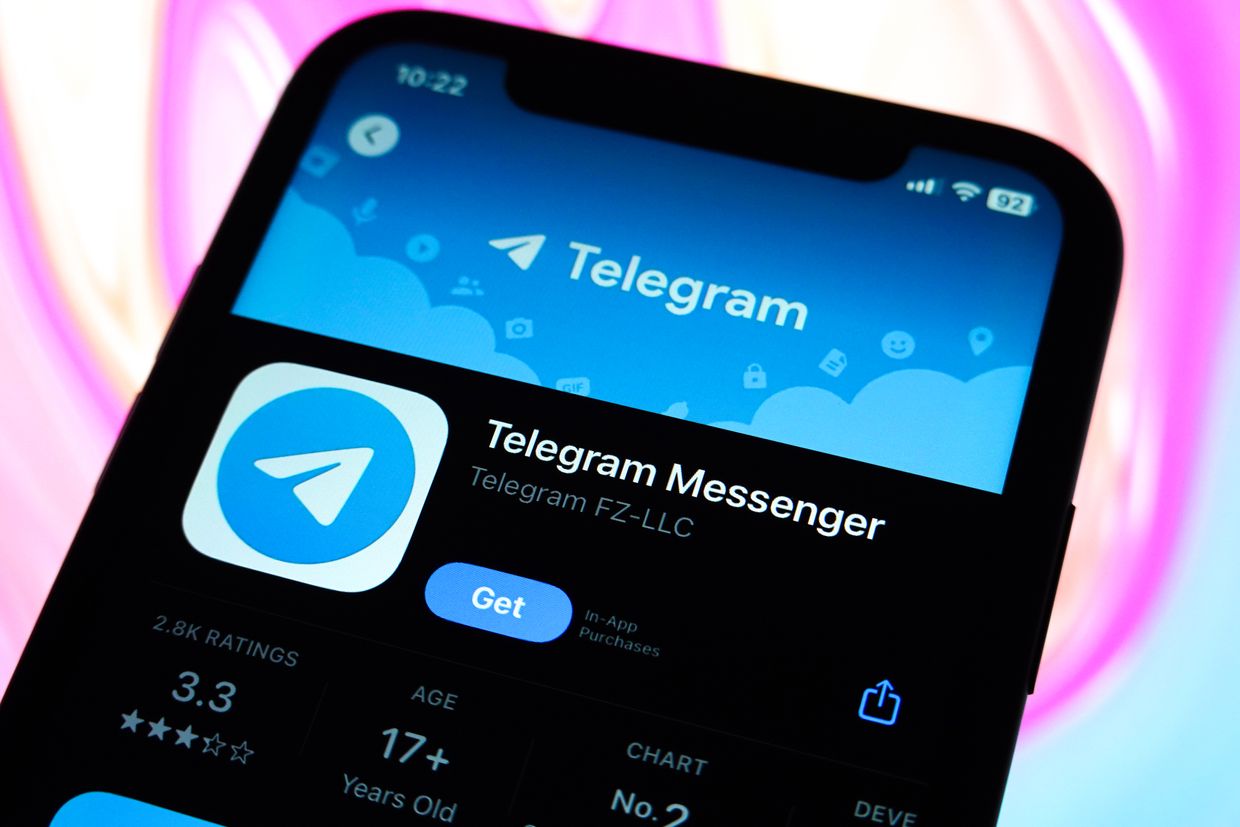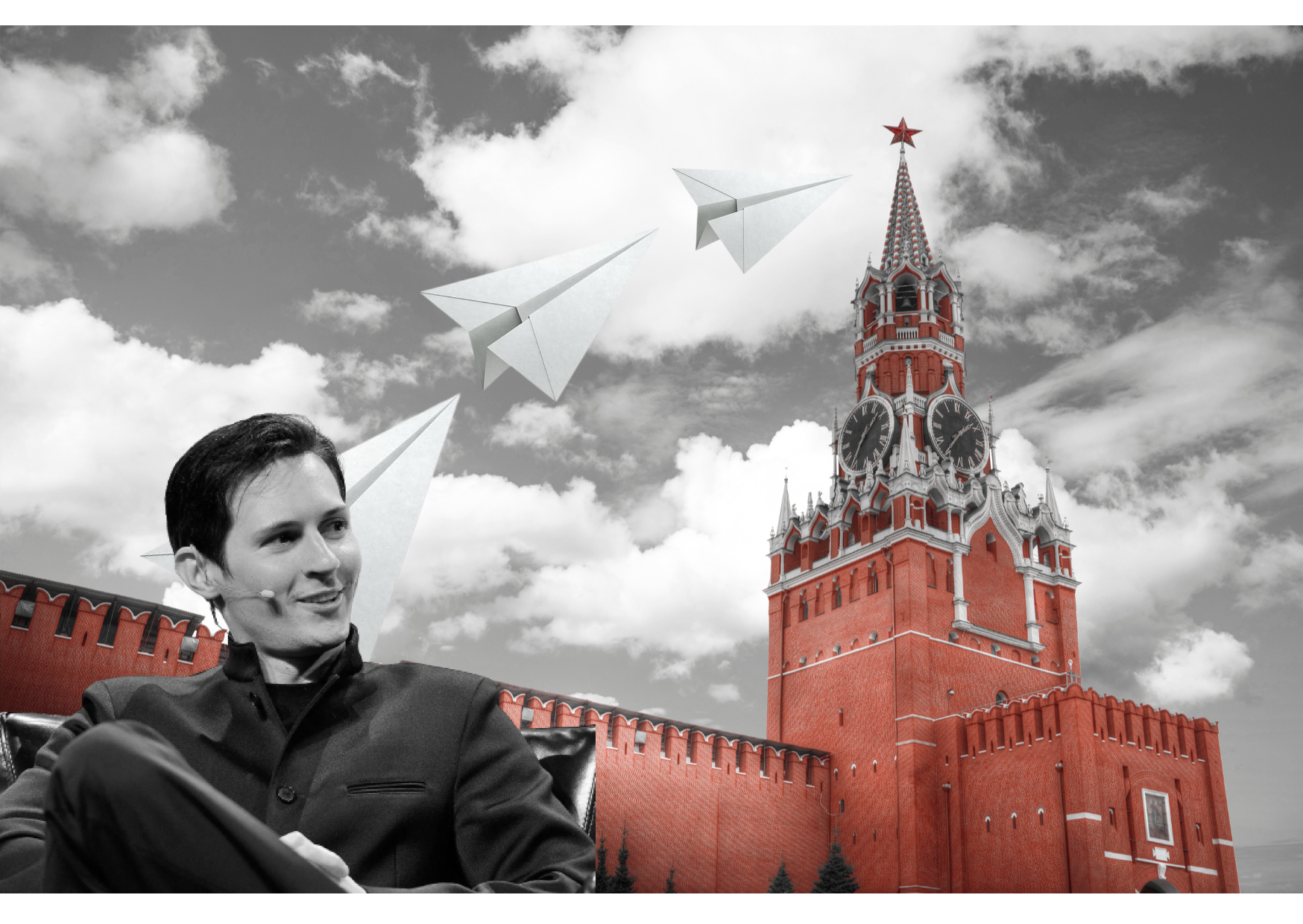Is Telegram, Ukraine’s most popular messenger app, a Russian Trojan horse?

The popularity of Telegram in Ukraine skyrocketed after the start of the invasion in 2022 – particularly due to its anonymous channels. (Illustration: Karolina Gulshani)
When Pavel Durov, a Russian tech entrepreneur who founded the Telegram messenger app, was arrested in Paris on Aug. 24 on accusations of allowing terrorism to blossom on his platform, Ukraine watched it closely. He was charged by a Paris court on Aug. 28.
In Ukraine, the charges against Durov reinvigorated the public debate about the security of Telegram. Some activists and officials have long sounded an alarm about the fact that while the country is surviving a full-scale invasion by Russia, its most popular messenger app and source of news is a platform founded and run by a Russian.
The popularity of Telegram in Ukraine skyrocketed after the start of the invasion in 2022 – particularly due to its anonymous channels that mass-spread information to subscribers while preserving full anonymity of the publisher.
Telegram channels have become the most popular source of news about the war in Ukraine, according to a poll conducted by the Ilko Kucheriv Democratic Initiatives Foundation and the Razumkov Center in late March.
Fifty-three percent of Ukrainians prefer these channels over information from relatives, YouTube, and the Ukrainian TV marathon – a pool of five TV broadcasters formed under the government’s directive to share resources and cover the war.
Moreover, while only 20% of Ukrainians used Telegram as a news source in 2021, this number surged to 72% in 2023, according to a USAID-Internews survey.
Some Ukrainians have long sounded an alarm about the dangers of Telegram.
Yaroslav Azhnyuk, a Ukrainian tech entrepreneur, argues that the Telegram’s rapid rise has worrying security implications. Azhnyuk has launched Kremlingram, an investigative group studying Telegram’s security and its potential ties to the Kremlin.
"It’s a Trojan horse that each of us has in the room, since almost everyone has a Telegram app on their phone," Azhnyuk told the Kyiv Independent.
A vigorous debate about security issues with Telegram erupted in Ukraine at the end of 2023. Top officials have openly called the platform a problem for the country’s national security due to its ties with Russia.

The functionality of Telegram is actively used by Russia, its military forces and special services to undermine Ukraine’s war effort and boost its own. Among such deceiving practices are fake accounts that pose as Ukrainian military or government resources, or bots collecting sensitive information about the Ukrainian military.
Anonymous Telegram channels that pose as Ukrainian but are actually Russian are a problem Ukraine has little means to fix. The channels operate without any oversight, and the platform has no regulations that tackle disinformation.
"The main issue with a certain group of Telegram channels is the anonymity of their owners," said Oleksii Danilov, former secretary of Ukraine’s National Security and Defense Council. “People should know who is responsible for disseminating information that reaches and influences millions.”
Rise of Telegram channels: From political gossip to harassment of journalists
During the 2019 presidential campaign, now-President Volodymyr Zelensky and his team relied heavily on social media to communicate with voters. After a landslide victory, the politicians’ new habit of using social media to communicate directly with the public remained.
Telegram became one of the key platforms used by members of the newly-elected parliament, and those focused on politics.
Several popular Telegram channels emerged in 2019 shortly after the parliamentary elections. Hiding behind names like “Joker” and “Dark Knight” (“Temnyi Rytsar”), anonymous authors published leaks and political rumors.
The leaks and insider access boosted their popularity, quickly earning them tens of thousands of subscribers.
“Dark Knight,” which promised to publish "the darkest secrets" of Zelensky’s team, was allegedly linked to Oleksandr Dubinsky, a notorious lawmaker later charged with treason and currently behind bars. This Telegram channel criticized the leadership of Zelensky's Servant of the People party, which Dubinsky belonged to, compromising some of its members.
"There is chaos in general (in the anonymous Telegram channels); people are making things up, writing about some of our meetings, some kind of nonsense,” Zelensky himself said back in 2020.
“This chaos has a great impact on the information field, creates chaos in people's minds, doubts, and negative emotions," he added.


Despite Zelensky’s comments, the presidential team appears to have learned how to use the anonymity of Telegram for its own benefit.
A group of popular Telegram channels has demonstrated exceptional loyalty towards Ukraine’s president and his inner circle. Given their flattering content, and the channels’ access to insider information, many assume they are run by the people inside or close to the President’s Office.
The President’s Office has repeatedly denied having control over any anonymous Telegram channels.
"I think it's nonsense to (suggest we) control Telegram channels," said Mykhailo Podoliak, an adviser to the head of the President’s Office.
Some of these anonymous Telegram channels have accurately predicted government reshuffles and presidential decisions. A few weeks before the dismissal of Deputy Prime Minister Oleksandr Kubrakov in May, the "Joker" channel (which boasts over 250,000 subscribers) started insulting and criticizing Kubrakov for allegedly collaborating with the National Anti-Corruption Bureau of Ukraine, or NABU. In 2023, Kubrakov reportedly helped the anti-corruption watchdog expose a pro-government lawmaker attempting to bribe him.
Kubrakov was dismissed weeks after Telegram channels started to viciously criticize him.
Journalists, anti-corruption activists, businesses, and the opposition have also been targeted by anonymous Telegram channels.
Amid growing pressure on the media, some journalists have raised concerns about a group of pro-government anonymous Telegram channels that they say discredit their work.
In one infamous case, a Telegram channel appeared to be involved in the offline harassment of a prominent independent journalist. Back in January, Yurii Nikolov, the journalist who revealed procurement wrongdoing in the Defense Ministry under its previous leadership, received a threatening visit. A group of people banged on his apartment door, shouting insults, and calling him a traitor.
The video of the visit, shot by the attackers, was then shared by the anonymous Telegram channel “Office of Cards” (“Kartochnyi Ofis,” named so as a reference to the popular show “House of Cards”), which has over 100,000 subscribers. Nikolov reported the visit to the police, who started an investigation.
Both the “Joker” and the “Office of Cards” Telegram channels continue to share posts that insult Nikolov.
Millions of followers, zero accountability
There are more than 52,000 active Telegram channels in Ukraine, according to the Telemetrio statistical platform. The most popular ones have millions of subscribers.
On top of the list is “Trukha” (originally “True Kharkiv”), counting 2.5 million subscribers.
Founded in 2019, it gained followers by sharing videos of traffic accidents, people spotted having sex in public, drunk brawls, and other trashy content.
After the start of the full-scale war, the channel grew even more. Today, the channel shares dozens of posts a day, a mix of news and advertising. Some of it appears to be unmarked advertising, such as posts about an oligarch’s charity foundation helping the military.
More importantly, “Trukha” became the first big Telegram channel to be acknowledged and effectively endorsed by the President’s Office. In October 2023, its founder was invited to attend an off-the-record meeting that Zelensky had with journalists of leading news outlets. Soon, the Telegram channel’s alleged owner, Maksym Lavrynenko, was attending presidential press conferences.
Remaining a Telegram channel of unclear ownership and no accountability, “Trukha” started to enjoy the access usually reserved for traditional journalists.
Adviser to Zelensky’s head office Podoliak, who has given interviews to “Trukha,” said he doesn’t consider it anonymous, as the channel has revealed Lavrynenko as its alleged founder and owner. Lavrynenko didn’t respond to the Kyiv Independent’s questions for this story.
According to an investigation by NGL Media and Grunt news outlets, “Trukha” is a network of more than 60 Telegram channels sharing similar content.

A parliamentary source told the Kyiv Independent that “Trukha” is a “purely business project” they claimed may have previously been linked to former Interior Minister Arsen Avakov, who comes from Kharkiv, where the channel was first founded. Avakov couldn’t be reached for comment. The investigation by NGL Media and Grunt suggests that the Telegram channel is now connected to Kharkiv businessman Volodymyr Lytvyn, a friend of Avakov's son. The journalists couldn’t reach him.
“Trukha just makes money,” the same source told the Kyiv Independent. “It rakes in tens of thousands of dollars per month. They had access to certain exclusive videos, and photos from the Interior Ministry database. They used them to promote themselves. Then the war began. They were already hyped up, and people needed to receive information quickly.”
Ihor Solovei, head of the Center for Strategic Communications and Information Security, told the Kyiv Independent that the unaccountability of anonymous channels like “Joker” is what attracts subscribers.
“Their license to do anything and lack of control attracts the audience,” Solovei said. “That is why anonymous channels feel especially comfortable on Telegram.”
“They have no accountability to anyone. Neither for the accuracy of the content nor for its quality, nor for the consequences.”
A number of anonymous Telegram channels appear to have access to closed military systems that track Russian missiles and drones attacking Ukraine. When an air raid alert sounds in Ukraine, they inform their followers on what has been launched and which regions are targeted. This isn’t reported by officials or traditional media – making Telegram channels an irreplaceable source of information about the aerial attacks.
A spokesman for Ukraine's Air Force said he didn’t know how the channels have this access, suggesting that some military units that have access to the radar system may share it with them.
Some anonymous Telegram channels also publish photos and videos from the sites of Russian strikes in Ukraine immediately after the attacks, violating the martial law regulations.
Telegram and Russia: Founder’s arrest sparks protest
Apart from the anonymity, Telegram has another problematic issue: The most popular messenger platform in Ukraine has Russian origin.
Telegram was founded in 2013 by brothers Nikolai and Pavel Durov. The duo had previously founded Vkontakte, later known as VK — a popular Russian social network that started as a copycat of Facebook. The Durovs sold VK after claiming the Russian security services were pressuring them to share the personal data of users, and left Russia. Their next project, no less successful than VK, was Telegram.
For years, Pavel Durov, the face of the project, has tried to distance himself from Russia. He lived in Dubai and didn’t identify as a Russian entrepreneur. A recent leak of border-crossing data found that he had traveled extensively to Russia, including around the dates when Russian authorities were trying to block Telegram.
When Durov got arrested in France in August on charges of allowing financial and cyber crimes committed on the Telegram platform, as well as allowing terrorist groups to use it, he got wide support among Russians. Both war-mongering Russians and anti-war Russians living in exile backed Durov and called for releasing him.
When Durov got arrested, some Russian officials and war supporters even said that Telegram was vital for Russia’s war effort.
“Telegram is used as a messenger by a huge number of our people, including those on the front line,” Former Russian President Dmitry Medvedev claimed.
Baza Telegram channel, which appears to be close to Russian security forces, claimed on Aug. 25, citing unnamed sources, that Russian officials and businessmen had allegedly been instructed to delete official correspondence on Telegram after Durov’s arrest. These claims can’t be verified.
President Volodymyr Zelensky said on Aug. 27 that the detention of Durov does not affect Telegram's work in Ukraine.
Telegram and war
Even before the full-scale Russian invasion, in 2021, the Security Service of Ukraine (SBU) said it uncovered a network of Telegram channels controlled by Russian special services that involved Ukrainians. Its task was to destabilize the situation in Ukraine and discredit the authorities, the SBU said.
Three years later, some of the channels on the list continue to operate, spreading messages with similar manipulative and pro-Russian narratives on sensitive topics such as mobilization.
Two of them – “Legitimnyi” and “Rezident” – have grown their audiences from over 100,000 to more than a million. They usually cite “sources in the President’s Office,” “Ukraine’s General Staff,” or “rumors” and concoct pessimistic war scenarios for Ukraine.
The SBU handed over the list of channels that spread Russian propaganda to Telegram’s administrators. At least some of them have been blocked, but not the popular “Legitimnyi” and “Rezident.”
A source in a Ukrainian law enforcement agency told the Kyiv Independent that after the Telegram administration blocked pro-Russian Telegram channels at Kyiv's request in the beginning of the invasion, Russia also requested the blocking of certain Telegram channels.
“The Telegram administration was not satisfied and said: we now work entirely according to our rules. And they have rules: to close a Telegram channel, you need sufficient grounds and a sufficient number of complaints,” the source said.
Ukraine has been trying to use Telegram to spread propaganda, too. The platform helps deliver information to the residents of occupied territories, who are flooded with Russian propaganda, said Kyrylo Budanov, the chief of Ukraine’s military intelligence, known by its Ukrainian acronym HUR.
Solovei said Ukraine had managed to win a certain audience in Russia by creating official communication channels, but the resources of the two countries are incomparable.
“Russia has invested a lot of resources both in weapons and in the development of its propaganda networks on Telegram,” Solovei said. “We simply won’t be able to compete on a level playing field with the Russians.”

In a recent alarming move, in late April, Telegram blocked chatbots used by Ukraine’s special services. These bots help to collect information on the whereabouts of Russian troops and equipment, and other intelligence for the war effort.
The channels were unblocked after several hours, but questions about the incident remain. An unnamed Telegram spokesperson told the media the blocking of the channels was a mistake that was quickly fixed.
Multiple reports highlighted one of the main security vulnerabilities of Telegram: the lack of default end-to-end encryption in Telegram chats.
"The real problem is the potential access of Russian special services to correspondence," Azhnyuk said. “The risk of this alone is so high. It means that you can get access to the personal data of the military, top officers, to their phones, and through them access to other apps.”
Telegram has denied any ties with Russian authorities or special services.
Can Ukraine block Telegram?
There is no sign that Ukrainian authorities are seriously considering blocking Telegram. They are, however, working on two documents aimed at regulating platforms that spread information, including Telegram, as well as countering Russian propaganda on such services.
The first is a draft law by a group of lawmakers aimed at adapting EU approaches in accordance with the Digital Service Act. This requires social media to have a transparent ownership structure, open a representative office in Ukraine, and communicate effectively with Ukrainian authorities.

"We need to know who owns (a Telegram channel), and whether Russia has any capital there,” said lawmaker Yaroslav Yurchyshyn, the head of the parliament's Committee on Freedom of Speech. “We need to know with whom we are communicating if we have questions about the dissemination of information in contravention of Ukraine’s Criminal Code.”
"If the platform does not respond to appeals (from the Ukrainian authorities), then it will be declared non-transparent," he added.
Some lawmakers are developing another draft with the SBU and the anti-disinformation body at the National Security and Defense Council. According to Yurchyshyn, it will restrict Russian propaganda, regardless of where it is spread.
"(Spreading Russian propaganda) should be punished harshly,” the lawmaker said. “Telegram and anonymity have nothing to do with freedom of speech, because no one is held to account.”
Yurchyshyn said he believes that the best option for those Telegram channels that want to be sharing information is to register as online media, which will effectively de-anonymize them.












